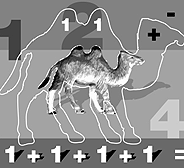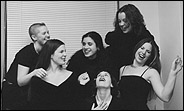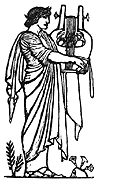of course
Removing blocks with blocks
 PHOTO: Tzigane
PHOTO: Tzigane |
|
You couldn't be faulted for mistaking the math teaching lab in the Faculty of Education for a kindergarten classroom.
At first glance, the students seem to be playing with such items as old milk cartons, farm animals and a pegboard.
Spend some time watching the class unfold and one thing becomes clear. Howard Riggs wants his students to understand that math doesn't have to be a chore. It can be fun.
Riggs, an educational studies professor who serves as the instructor for "Teaching Mathematics I," has named each learning station after a prominent female mathematician. There is a message in this as well.
The vast majority of education students are female and women tend to have more math phobias than men, says Riggs. "I do this to say that women can succeed in math too."
Not that Riggs's mission is to turn out female mathematicians; he just wants his 186 students to gain some concepts with which to think critically about learning math and acquire ways of teaching that are appropriate for elementary school children.
He also wants to get rid of any math phobias among his student teachers before they go into the classroom. "Your feelings are infectious," he believes.
Today, the theme of the lab is "modelling ideas." Using the materials provided at each of the six stations, the students learn how to develop models for such problems as: "A farmer's 35 animals have a total of 78 legs. Some are cows, some are chickens. How many cows does the farmer have?" At another station, the students have to evaluate the usefulness of the materials provided with which to make models.
Riggs believes that in the lower grades, models, in the form of concrete objects such as blocks or tokens, are best for illustrating more abstract notions like the concept of "four," which as a written number has no inherent meaning.
"[Concrete models] give children the chance to handle objects, to make abstract ideas more meaningful to them," he writes in his course manual, entitled The Joy and Power of Math.
Helen Vamvakas, a second year education student, is one of those who hated math in elementary school -- though she appreciated her math teachers in high school. She's just figured out on the computer the formulas for the area and perimeter of a rectangle.
Considering herself a moderate mathphobic, Vamvakas says of Riggs: "It's the creativity and the games that he shows us which really help us learn both to be a teacher and what it's like to be a pupil. In elementary school, I never got an explanation for why anything times zero equals zero. Professor Riggs made us figure that out."
Let's talk... vagina
 The cast of McGill's production of The Vagina Monologues
The cast of McGill's production of The Vagina MonologuesPHOTO: Liz Mavor |
|
February 14 may signify Valentine's Day to most, but for nine McGill students it signifies a more important V in their lives: vagina.
As in The Vagina Monologues, a play first staged off-Broadway three years ago and which continues to be performed at a growing number of North American colleges and universities on "V-Day."
V-Day concerns vaginas, valentines and violence. It was conceived to be a day on which reflection, action and fundraising would help alleviate violence against women and its aspirations are international. As the slogan says: "Valentine's Day is V-Day until the violence stops."
The McGill production of The Vagina Monologues, with players Brianna O'Connor Hersey, Greta Papageorgiu, Vanessa Guillen, Catherine McInnis, Katy Pedersen and Sheryl Faith, under the direction of Alison Lemoine and Sophie Johnson and the stage management of Ashley Wheaton, will donate the proceeds of last night's preview performance to a local women's shelter.
Lemoine decided to bring the play to McGill after being "dragged" to see it last summer in New York.
"I didn't think I wanted to hear all about vaginas," she says. However, finding the play both funny and poignant and that it had to do "with women's feelings about their sexuality," Lemoine asked about buying the rights. When she was told the play was free if performed for a V-Day program, she leapt at the opportunity.
The experience of putting on the play "has had a big impact on our lives," says Lemoine, an English student. "It made me open to discussing topics that I'd been afraid to confront before."
The Vagina Monologues run Feb. 14-16, 8 pm at the Redpath Museum Lecture Hall. Tickets are $10, $7 for students. Phone 286-2481 to reserve. The V-Day website is www.vday.org.
MBA students go digital
 PHOTO: Owen Egan
PHOTO: Owen Egan |
|
Looks like computer geeks aren't the only ones itching to get hired by dot.com enterprises. MBA graduates want in on the action, too.
So it wasn't surprising to learn that the McGill MBA E-Commerce Club (MMEC) recently held its first ever career fair for jobs with a decidedly digital bent.
The event was a bid to secure more e-commerce jobs for MBA grads and was attended by representatives from 17 companies, including BCE Emergis, IBM and Bombardier, which sent recruiters to scout for e-savvy employees among the 70 students present.
"Most high-tech companies have tended to hire way more people with computer science backgrounds than they have MBA graduates, " says Angela Yuan, MMEC co-president.
Why? "Because e-commerce is a new field and high-tech companies are still in the process of seeing where MBA graduates fit within (their ranks)," she continues.
That's why Yuan, along with MMEC co-president Qing Yan, created the club in May 2000 to help spread the word that hiring MBAs can be beneficial to the e-commerce community.
Modeled after a half-dozen similar associations in the United States, the MMEC numbers 121 members -- a third of all McGill MBA students -- and is among the first of its kind in Canada.
Despite the deflation of the dot.com boom, Yuan says e-commerce is here to stay. She points to how many traditional businesses have recently established e-commerce sites, from the Bay to Canadian Tire, as illustrations of how online commerce is only just beginning and is bound to expand.
That's where the MMEC and its career fairs come in. "We want to show e-commerce companies that MBA graduates can analyze business strategies not only at the traditional retail level," Yuan says, "but online, too."
For more information on the McGill MBA E-Commerce Club, please consult www.eclub.mcgill.ca
Bringing poetry to engineers
 |
|
The Friday afternoon graduate seminar in metallurgical engineering was unusually well attended a few weeks ago. The subject: an experiment in poetry and music.
The only metal involved was in the musical instruments and the sound equipment, but that didn't bother mining and metallurgical engineering professor Janusz Kozinski.
While engineers aren't generally thought of as the type to listen to Debussy or mull over the works of Byron, Kozinski knows that there are plenty of engineers out there with an appreciation for culture.
Cultural events were regularly organized by the schools of engineering where he trained, both in his native Poland and at MIT, and he felt his own graduate students could benefit from a break in the language, thought and rhythm of engineering.
As luck would have it, the father of a school friend of his son's was a poet and poetry performer. Kozinski broached the matter of a performance in his department with Matthew von Baeyer. The one-time English professor was elated at such an unusual opportunity, as was David Gossage, a prominent Montreal musician and collaborator with von Baeyer on their CD Melopoiesis (song and poetry), the name given to the engineering event.
Among the 80 mining and metallurgy graduate students, undergraduates and faculty members in the audience was Mahrdad Zarinejad, a graduate student from Iran. "When I saw the lists of poets and poems, I was very happy," he says. It was the poem "Like This," by the 13th century Persian poet Rumi, that moved him to tears.
"Even though it was in English, I could understand all the good feeling of the original text," he says. "It was the first time in my two years here that there was something [like this] for engineers." In Iran, explains Zarinejad, performances of poetry, music and other forms of culture were organized by the engineering faculty.
"I think [such events] are important; it's both entertaining and it broadens your horizon. You need a change sometimes, otherwise you risk getting too one-dimensional."
Given the warm response he received for organizing the performance, Kozinski plans to organize more and he will open the next one to the entire Faculty of Engineering.

